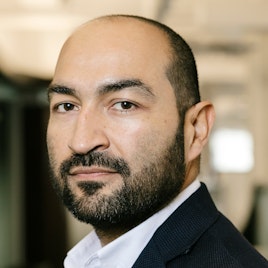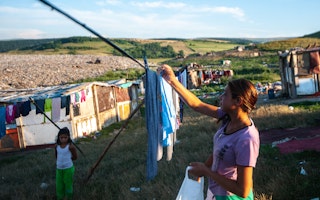Happy Christmas (War Is Over): But Little Cheer for Roma IDPs and Refugees
By Bernard Rorke & Zeljko Jovanovic
The following originally appeared on the Decade of Roma Inclusion website.
Tarmis Urmin fled from Klina in Kosovo in 1999 and now lives in the Roma settlement of Borca in Belgrade. Three times he has made the 150 km trek to the registration office in Kragujevac in vain attempts to obtain documentation. He explained
My wife has no documents and therefore our four children cannot get documents either. When I brought my youngest child to be vaccinated the medical staff demanded 2000 dinars (about 25 euro). I had no money and could not afford it. They shouted at me and my family that if we know how to make children we should know how to get documents.
His family's desperate plight as forgotten casualties of the Balkan wars is all too common, and official indifference towards undocumented and displaced Roma remains all too persistent and pervasive across the Western Balkans.
Back in 1998, more than a year before the outbreak of war in Kosovo, Roma writer and activist Orhan Galjus warned of the perils facing the Roma, caught between the official Serbian and the clandestine Albanian state structures. He predicted that "if there is war in Kosovo, Roma will again be blamed for nonparticipation, just as they were in the Serbian-Croatian-Bosnian conflict. They will be stigmatised as deserters and traitors". And so it came to pass. A wave of brutal reprisal and terror targeting Roma followed the formal cessation of hostilities. So-called 'reverse ethnic cleansing' which included murder, rape and the burning and looting of entire mahali prompted mass flight and displacement.
Before the war, the Roma population in Kosovo was estimated at 150,000. By the end of the conflict, less than 50,000 remained. In addition to those who fled to Western Europe many more sought refuge in the neighbouring territories of Serbia, Montenegro and Macedonia. Ten years after the final Balkan war, across the republics of the former Yugoslavia many thousands of Roma lack basic documentation, remain displaced, their status uncertain and unresolved. Non-persons in the eyes of the authorities, they are effectively deprived of the very basic right to have rights.
From Kumanovo, activist Asmet Elezovksi, Director of the National Roma Centrum (NRC) estimates that some 4000 Roma in Macedonia do not possess personal documentation, as many as 2000 refugees from Kosovo and Serbia, a high percentage of them children. He stated that "Civil registration is a fundamental prerequisite for access to civil, political, economic, social and cultural rights". He finds it "very sad that children born this year and last remain unregistered" and that the problem is aggravated by complex and expensive administration procedures.
Since 2007, as part of a long-running campaign 'Empower the Woman: Empower the Community' supported by Open Society Institute's Roma Initiatives, NRC has successfully registered about 490 people with 96 cases currently pending. Among the factors Elezovski identified inhibiting Roma from registering their children is a lack of awareness that registration of all new-borns is obligatory; additional costs and complex procedures for registering children after the statutory 30-day period from the date of birth; refusal by hospitals to issue documents for Roma mothers not covered by health insurance. For children born abroad, once 'returned' it is difficult, complicated and expensive to access the necessary documents; those born in time of war and flight, amidst the chaos and collapse of bureaucratic administrations face similarly costly, lengthy and legally complex obstacles.
Sarita Jasarova of NGO LIL has also been actively campaigning on behalf of the undocumented for nearly five years in 4 settlements near to Skopje. She stated that the lack of birth certificates, identity cards or other legal documents prevents many Roma from acquiring citizenship or residence permits, and denies them access to the most basic services "without which a normal life cannot be imagined." As part of wider efforts to combat school dropouts, Jasarova persuaded one local school to accept 20 children informally while the necessary papers for enrolment were being processed and proudly announced that in the past year, in the four settlements, every newborn Roma child was delivered in a hospital and registered at birth.
The team at NGO LIL works tirelessly, canvassing Roma settlements, coping with a stream of urgent and desperate clients, alternatively badgering and mediating with local authorities, frequently commuting between Skopje, Pristine and Belgrade to sort out and resolve complicated cases. In their work to date with Roma from Kosovo, they have obtained the necessary documentation for 61 families to enable them to acquire Macedonian citizenship.
According to Belgrade-based Roma researcher Nadja Rakocevic, in addition to the 23,000 Roma officially registered as IDPs from Kosovo, Serbia is facing a new influx of returnees, the most vulnerable of them Roma. In addition to being impoverished, some 60-70% have incomplete documentation. Many IDPs and domiciled Roma living in Belgrade slums are unable to register for their residence permits, and face the prospect of homelessness when irregular settlements are demolished by the city authorities. In May 2008 UNHCR launched the first comprehensive free legal aid program for Roma communities as part of a wider EU-funded regional program for Social Inclusion and Access to Human Rights of Roma, Ashkali and Egyptians in the Western Balkans. The main goal is to enable Roma communities gain free registration in birth registers leading to issuance of personal documents and improved access to social, health, education, housing and employment services.
What's missing from the government's side, according to Rakocevic, is "joined up and efficient cooperation between different ministries responsible for this issue: to this day procedures remain lengthy, expensive and complicated." As is the case right across the continent concerning Roma, the issue is further aggravated by the lack of reliable, ethnically disaggregated data. As Director of the Forum of Roma IDPs, Mensur Haliti explained: "According to the Deputy Minister of Labour and Social Policy, about 10% of the Roma population in Serbia lack personal documents. According to the official census this would be about 10,000 people; according to the estimates the total of undocumented could be as many as 40,000."
Earlier this month Thomas Hammarberg, the Council of Europe Commissioner for Human Rights, called upon European governments to stop concluding or applying readmission agreements for returns to Kosovo and declared that "the time is not right for returns in general let alone forced returns". He followed this with a letter on December 15 to Germany's Chancellor Merkel calling for a halt to forced returns of Roma to Kosovo "as long as the situation there does not guarantee a safe and sustainable life for returnees."
Hammarberg expressed particular worry that those Roma already expelled had to return to the lead-contaminated camps of Cesmin Lug and Osterode in northern Mitrovica and repeated his call for an immediate closure of the camps. He described Kosovo as a post-conflict society still struggling to come to terms with the consequences of the armed conflict: "It has not the infrastructure that would allow a sustainable reintegration of refugees. This goes all the more for Roma, the biggest minority in Europe subject to wide and systematic discrimination."
The pity of it all is that Hammarberg's appeal for basic decency will likely go unheeded, and the process of forced returns will proceed unhindered. But this need not be: 2010 marks the mid-point of the Decade of Roma Inclusion, and next April 8, the Spanish European Union Presidency will host the 2nd EU Roma Summit. The plight of Roma returnees, refugees and IDPs needs to be placed high on the agenda. Political expediency need not trump respect for human dignity. There is time for the governments of Western Europe and the Western Balkans alike to make it their New Year resolution to heed Commissioner Hammarberg's words that 'return' is not a purely technical administrative act: "it means to receive and re-integrate returning people and families in dignity and security, and in a sustainable way".
Until December 2013, Bernard Rorke was international research and advocacy director for the Roma Initiatives Office.

Until February 2024, Zeljko Jovanovic was director of the Roma Initiatives Office.


